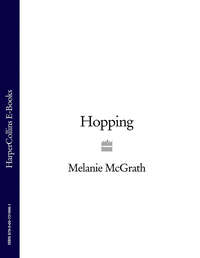
Полная версия
Hard, Soft and Wet
Boulder Creek was a logging town until the Silicon Valley suits started moving in, and though it still has some of the tarry conservatism and pine-needle neighbourliness left over from those days, the racketing confidence of new money runs through its veins.
In the driveway where Alex lives a woman is loading bags into a station wagon. She looks up at me, wary, and gestures with her arm towards the porch but before I’ve reached the door a man has already opened it and ushers me in, muttering, ‘My wife is running into town to pick up some supplies because friends of theirs think there’s going to be a storm.’
Alex’s father, Peter, is one of those gently cumbersome, ursine men peculiar to North America; a biter on life, a big-eating, big-earning human Panzer tank. According to Nancy, he develops virtual reality software for financiers and the US military, through which connection they are on waving terms at industry parties. His job is to write code so complex that it can trick a person into imagining he’s moving through a stock exchange, or crouching in a bunker and surveying the horizon, when all he is really doing is processing data projected on to a screen and held fast in front of his eyes by a helmet.
Wasting no time on niceties, the human Panzer waves me into an armchair, surges over to a cupboard by the kitchen, dives in and comes up for air minutes later with a black strip of a thing trailing cables from its sides. Plugs it into a computer on the table.
‘This,’ he announces, ‘is a total immersion VR helmet.’
The thing in his hands shines like a black ball of insect eyes. He urges me to put it on. Inside the helmet a blue room rises. For a moment it feels as though I’m in a deep sea diving bell, listening to the steady purr of my breath and drinking in the first view of a newly discovered territory.
‘It’s great isn’t it?’ Peter tips me very gently with the ridged track of his palm. ‘Look, when you move your head, the computerized world of images inside the helmet moves with you.’ I glance down at the depths, and look up at the heights. All blue. Too blue to belong to for long. I lift the helmet from my face to find a little boy watching impassively, marking time in the way that children often do. This is Alex. A regular-looking three-year-old. Matt brown hair, Bermudas and a sweat shirt, nothing like the grinning future-creature I’d envisaged at the weekend. I’m shamefully disappointed.
‘So, Alex, buddy,’ says the father to his son, ‘say hello.’ He gestures towards me.
‘Hello,’ obeys Alex, inching forward. We cross gazes for a moment then I open with a question.
‘What’s your favourite colour, Alex?’ I’m imagining that it must be blue. VR blue. But Alex merely looks at me, turns tail and toddles back to his room. He returns with a Bart Simpson doll.
‘Bart Simpson, great,’ say I, taking the doll, ‘but you play with computers, too, don’t you Alex?’
The boy scampers back to his room. Returns with a Bugs Bunny wind-up toy. Winds it, sets it pacing and begins squealing in time with the clockwork.
‘Do you have any electronic toys you could show me, Alex?’
Alex contemplates, snatches Bart Simpson, flees back to his room. Five minutes later he comes running out clutching a Power Ranger.
‘Look,’ says Alex, sprawling on the carpet and using the Power Ranger’s face to shovel out some of the shag pile. ‘Cool.’
‘So it is,’ I chirp, then more sly, leaning down to whisper in the boy’s ear, ‘but I bet it’s not as cool as the games you play with Dad’s computers.’
Alex pushes my head away in disgust. The head incidentally which is booming along the temples in time with my breath and pulse.
Peter returns from putting away the VR helmet. ‘Alex first wore one of those things on the fourth of July 1992, when he was just over a year old. The youngest kid ever. He loves it. Navigates through buildings, whole star systems in virtual reality. Doesn’t even know the alphabet yet. Now, Buddy.’ Peter turns his attention to his son and lifting the boy onto his knee, silencing the squeals, whispers ‘tell us what you put on when you’re playing special games.’
‘A head-mounted display,’ returns the boy, unimpressed.
‘And what does that do, Bud?’ Peter backs up into his seat, then manoeuvres his body forward again at a different angle, as though he were the driver of some intractable piece of plant.
‘Oh, you know,’ the boy follows Bugs Bunny crawling across the carpet. ‘You get to see things, and when you move …’ Tails off.
‘Yeah,’ says Peter. ‘And what happens when you move, Bud?’
‘Uh, you get to see more things,’ confirms Alex, clambering down from his father’s lap and running away. He returns from his bedroom with a Tonka toy.
‘This is heavy,’ he says, holding it out for me to feel.
Peter shoots me a look of mock despair, mixed in with a chesty heave of involuntary pride.
‘I was thinking. A while ago a German film-maker guy came over and took some film of Alex wearing his virtual reality helmet. He was a baby then. We’ve got it somewhere in the den if you’d like to see it.’ He motors off, tagging Alex, who has discovered a bamboo cane and is waving it to make whizzing noises in the air. Peter finds the tape and fast forwards it to a shot of a baby, naked except for duvet-diaper and VR helmet, blind to reality, grappling with his hands for something in the virtual world behind his eyes. Peter giggles with recollected affection for the Alex that was, while the Alex that is prowls about the room, as yet a shadow of a person made bright with temporary definition.
Just then the wife bursts into the room, registers the video, smiles to herself and at Alex and shakes some dampness from her hair.
‘It’s raining already. I think it’s going to be some big storm. The forecasters are going crazy.’ She stares at me with a doubtful eye. I feel myself returning the look, and we catch each other’s eye, exchanging hints of competitive pride and a resistance to the other’s unoffered pity. Rain begins ticking on the window panes.
Alex, oblivious to all this, toddles about happily brandishing his bamboo cane. His father pulls him close, thundering into his ear.
‘Tell us how you use a computer mouse, Bud.’
‘I click and something happens. I click and something turns on.’ The mother retreats from the room and switches on a radio somewhere. Peter ignores the music and rumbles ahead:
‘Alex has been playing this game I wrote for VR, called Neo-Tokyo. Actually, we play together. You’re the renegade pilot of a high-speed police hovercraft, and you have to steer your vehicle through the city, shooting out billboard advertisements. It’s cute.’
‘Everything breaks,’ remarks Alex, unasked. ‘I shot a window and I shot a sign.’ He dismisses the light stick and climbs up into his father’s lap.
‘You were going everywhere, Dad, and you were shooting.’
‘Yeah,’ says the father.
‘And there were some bad guys and I got them.’ He looks up at his father for a reiteration but the father merely smiles and raises an indulgent eyebrow.
‘No you didn’t, Bud, there aren’t any bad guys in NeoTokyo, remember?’
‘Yes there are,’ says Alex, emphatically. ‘I shot them.’
I suddenly realize that my little game is going to be harder to play than I had first imagined.
Out on the road leading back east to Palo Alto, the rain is punching fierce cold fists, drumming at the windscreen and emerging in dirty great geysers at the side of each wing mirror. The radio hisses in and out of non-stop country hits, overlaying Kenny, Tammy, Dolly, Garth and the rest with the dim waves of a news flash from some other station announcing that a state of emergency has been declared around San Jose.
It’s times like these that an alternate reality would be really handy. And not just a blue VR room, either, but a place with substance, in other colours. You could plug into a beach there and wait until it’s all over. On the other hand, there is something so absolutely American about blustering, muscular weather like this that you’d have to be a fool to want to escape it. Great, roaring weather it is, as big as the forty-eight.
A captive stick begins to whirr its way round the front nearside wheel arch, spinning rainbowed water onto the bonnet. Underneath the chassis, the four low tread tyres skate along on a meniscus of grease and every so often the suspension bumps over fallen branches and other dead things, sending the car sidling towards the silt-laden river by the side of the road. I’m wondering whether I should stop at the first big town, find myself a pay phone and call Nancy, but I can’t make out any exits off the highway.
The police have set up a road block at Mountain View. I pull up and leave my headlights burning. A cop with a torch runs over, hunched against the rain. Leans into the car.
‘We’re about to close 101. There are some nasty holes opened up five miles north of here. Is your journey absolutely necessary, ma’am?’ Shouting against the beat of water on the blacktop.
‘I’m going home.’
‘And where is that?’ I consider how to answer this, think of Nancy.
‘Marin County.’ The cop lifts his hand to cut me short, shouts something into his cop phone, then leans back in again. A rope of rainwater bungees from his hat, blackening the upholstery.
‘When did you begin your journey, ma’am?’
‘At nine o’clock this morning, give or take.’
The cop checks in over the phone, waves me forward.
‘We’d have turned you back if you’d known there was going to be a storm, but we’re gonna let you go through this time ’cause no one saw this thing coming. Stick to the far lane and you’ll miss the holes. Go slow, now.’ I nod, and switch the window up. Only the weather seems to know its own future.
Nancy is sitting at her computer reading off her e-mail.
‘Some storm,’ she says, checking to see I’ve taken my shoes off. ‘Erica was saying that quite a few folks in Marin don’t have any electricity.’
Naturally I’ve no idea who Erica is, but in this case, it doesn’t matter.
‘How was Alex?’
‘Sweet. Normal. I mean, I don’t know, I haven’t really had time to think about it.’
‘I tell you,’ says Nancy, ‘Silicon Valley is like one big prototype-farm right now. Some kind of mutant factory. They’re turning out new patents down there fast as McDonald’s turn out burgers. Software prototypes, business prototypes, chip prototypes, even prototype kids.’
I snicker, expecting Nancy to join in the joke, but she surprises me by tossing out one of her super-serious looks:
‘You’d better believe it, Sweetheart.’
THURSDAY
Vote now!
The sun is back this morning, burning off the rainwater and leaving a crust of dried mud, twigs and storm debris on the blacktop of the 101 freeway running south from Marin. In the queue for the post office in Sausalito the talk is of the neighbours’ broken shingles and the sleepless night, and the air down at the houseboat pier fronting onto San Francisco Bay still smells as strongly of static cling as the upholstery on rental cars. And all this some four or five hours after the final lightning strike.
Nancy has given me a list of groceries to buy at Mollie Stone’s and a book – the first published guide to the Net, signed by the author, an acquaintance of Nancy’s from her college days. She makes me swear on a carton of Ben & Jerry’s not to lose it.
The inside of Mollie Stone’s feels more like a provisions cathedral than a supermarket. Along either side of the aisles sweet indulgences dazzle the nose and promises of edible heaven line the shelves. At the fish counter the whole of the sea bed from San Francisco to Patagonia lies outstretched and odourless upon its icy lilo. Trial titbits of this and that lie in wait round each corner to assault your senses and dizzy you into a purchase. A sales clerk lurks about to take your money while your eyes are still in reflex action. There are six varieties of sun-dried tomato, twenty-four styles of chocolate biscuit, spaghetti in seven flavours. In the fruit and veg section organic Guatemalan mange tout fight for space with Napa Valley chanterelles and things I’ve never heard of. There’s no lettuce, as such, only Batavia, Butternut, Beet leaf, Romaine, Radicchio, Rocket and Stone’s special selection, all ready to go. The whole store reeks of money. Northern California reeks of it.
Turning left at the end of the Oakland Bay Bridge I find myself in Emeryville, a strip of waterfront warehouses, malls, parking lots and golf driving ranges looking out over the black quays of Oakland to San Francisco. Mr Payback, billed as the world’s first interactive movie is playing at a specially converted theatre in the United Artists multiplex just round the corner.
A typical matinée crowd of truant teens, retired couples, students and lonely housewives beats about the ticket counter chewing popcorn and waiting for friends or for the start of their movies. Further inside the overactive air conditioning blows the smell of estery butter sauce out through a series of metal vents into the larger space of the foyer. TV screens show clipped versions of the new releases to a scattering of people sitting on the padded benches set around the walls. An atmosphere of quiet separation prevails, lending the building the genteel air of a public records office with all its dark secrets locked up in mysterious boxrooms off to the sides.
While my eyes are still adjusting to the shade in theatre five, six Chinese boys press past, heading towards the screen, murmuring, ‘Hey, cool,’ at their first sighting of the modified seats, each fitted with a joystick carrying three buttons in green, orange and yellow. I check my ticket, move down the steps to row L and settle myself into a seat behind the boys. The speakers begin to spew out soft rock numbers by Bread and Captain Beefheart. Within seconds of finding their places, the boys have already mastered their joysticks and are lost in a thick din of clicking thumb candy. Aside from myself and the boys, huddled together into two rows, the theatre is empty.
I sink into the velvet scoop of L14 with my coat about my legs to ward off the air conditioning, and position three of the fingers of my right hand on the green, orange and yellow buttons of the joystick in front to get the feel of it. Each button gives to pressure with a handsome poot and a wiggle of resistance.
‘Maybe it’s like the orange button is BLAM, and it offs the bad guy and the green just puts him in jail for life,’ speculates one of the boys, pounding his joystick.
‘Like, who, man?’
‘The bad guy, asshole.’
And the row of boys begins clicking as if their thumbs had evolved precisely for the purpose.
Voice-over and a red Testarossa on the screen: ‘The world is digital, fibre optic, cellular, but still there are assholes, jerks and scumbags around.’ Dissolves into the Title Sequence. The voice-over says ‘When you see the “VOTE NOW” message press the orange, yellow or green button on your joystick to make your selection. The film will then follow whichever selection wins the largest number of votes.’
Barely a minute in, before the stain left by the opening credits has fully faded from my eyes, the words ‘vote now’ appear in flashing dayglo, and an involuntary surge of adrenaline darts through my right hand speeding the fingers into a rise and fall. A multitude of clicks. I’m caught short by how much it matters to press down and win.
‘Vote orange, orange, orange.’ One of the Chinese boys in the row ahead is shouting. I can taste the concentration carried on his breath, the thrashing excitement, can feel the throb of clicks coming up through the fabric of the walls like some universal pulse.
The film slips seamlessly beyond the vote into the next act. A familiar smell of static rises from the seats. I’ve no idea exactly how I’ve voted, but it hardly matters, since it wasn’t so much a vote in any case as a series of miniature acts of incursion. Press, press, press, tap, tap, tap, click, click, click, the will of the flesh bearing down onto a lifeless ring of green and yellow buttons.
The high of the moment quickly passes and I’m left staring through the gloaming at the row of stiffened necks and knotted hands belonging to the boys in front. Whatever thin narrative is flickering across the screen is irrelevant. Only when the next ‘VOTE NOW’, the insistent call to arms, appears will our heads rock and our fingers bounce and the spells leak out from our bodies and animate for a few seconds the dead passage of the square of light ahead of us.
We don’t have long to wait, for within a matter of a few moments the words ‘VOTE NOW’ are flashing on the screen and my lungs begin to demand their breath in shallow shots, tapping out the rhythm of the next click, the next hammering vote, the clueless choice, the next small pulse of power that will electrify the web of nerves running along my arm and pull at the muscles of my right hand and finally set off the cushion of cells along my fingertips.
Thirty minutes after it first began, seven brain-dead people stagger out of theatre five into the foyer in a kind of ragged trance.
One of the boys says it was cool. Another says it was galactic.
Back at Nancy’s house I unpack the shopping in a daze, reminding myself to squirrel away a few of my more creative impulse purchases such as the slab of dried Greenland halibut and the packet of cream of tartar behind the tins in Nancy’s store cupboard. I’ll confess to my product promiscuity the next time I find her in a particularly good mood. Meanwhile, a few remaining extras will have to be consigned forever to a dark spot under the bed in the spare room. I’m not sure even Nancy would be able to forgive Japanese pickled strawberries and black finger fungus.
With an hour to kill before she’s due back I flip through Nancy’s manual of the Net, but soon find myself struggling for comprehension through the pile of abstract, dreary jargon: ftp, tcp, pop, ppp. I mean, what is all that? It sounds like radio interference.
FRIDAY
As she’s leaving for work, Nancy invites me to a talk on education and technology being held this evening in the Valley.
‘You’re interested in the future, right?’ she says.
‘Well, yeah.’ I look up, uncertain of her tone, but the expression on her face has already moved on.
‘Sweetie, education and technology are the ways the future gets made,’ she says.
And with that she jumps up from the table, swings back that clot of brown hair and transforms immediately into Nancy the software marketer.
‘Why don’t you go browse my clippings box? Also there’s a big crate of articles and whatnot in the garage.’
In the garage it looks as though the San Andreas fault exploded over everything. Where the clippings crate might be among the heap of basketball nets, broken toasters, project files, back issues of Cosmopolitan and Wired, and beaten-up old software packages is anyone’s guess. Eventually, following a half-hour excavation I dig out the box from under a fortress of old Vanity Fairs and flipping through the disintegrating leaves of newsprint read the following:
28% of teenagers are screen addicts, 24% grey conformists. Annual US spend on entertainment and recreation reaches $34obn, only $27obn for elementary and secondary education. $800m spent every year in US on TV ads to children. Deyna Vesey, Kidvertisers’ Creative Director, says ‘the general rule of thumb is, once a kid is three, you can go after them on TV.’
American kids under twelve spend $8.6bn, 13–18 year olds spend $57bn.
And so it goes on, an avalanche of abstracted facts, public opinion surveys, vox pop statistics, flow charts, graphic predictions, trend tables.
The Sausalito Library’s catalogue of books lists a handful of titles under the category ‘adolescence’, including:
The Power of Ritalin: Attention Deficit Disorder among Teenagers
Educating the Disturbed Adolescent
Suicide Among Adolescents
Coping with Teens
The Handbook of Adolescence, Psychopathology and Anti-Social Deviancy
It seems adolescence is treated as some kind of disease rather than a normal part of the human life cycle these days, but we feed on images of it still, like a flock of ageing carrion birds.
Nancy picks me up at six and we drive down to Mountain View for the education and technology talk. Inside the conference room at the Hilton a couple of hundred people in power suits with full shoulder extensions, sprayed hair and pigskin attaché cases flutter about with their business cards like tickertapers on VJ day. It’s all so eighties, somehow.
‘Where are the teachers, Nance?’ I ask, looking through the suits.
‘This meet is more for Valley types,’ says Nancy, fingering an Evian spritzer. ‘You know, software providers, consultants, techno-visionaries, wizards, that kind of thing.’
I flash Nancy one of my disgruntled looks.
‘I thought it was supposed to be about education.’
‘It is, but so what? We’re talking about a whole new technological revolution in the classroom. Kids won’t need teachers any more. They’ll need software supervisors.’
‘Jesus, Nancy.’
‘Look, Sweetie,’ Nancy is already moving off into the crowd, ‘I have to keep ahead, OK? It’s my job, if that’s all right with you.’
Nancy finds me after the talk.
‘Sorry,’ she says, ‘I had to network. What did you think?’
We spin through the smoked-glass doors and out into the evening. The question bothers me, although I’m not quite sure why. A wave of defensiveness beaches itself at the front of my mind and I realize I’m reluctant to admit what I’m actually thinking, since it contradicts what I’d rather be thinking.
‘I dunno,’ I say by way of reply. ‘Ask me later.’
We decide to stop off for dinner at ‘the place everyone in new tech is talking about’, the Icon Byte Grill in the SoMa district of San Francisco, or Multimedia Gulch as it’s becoming known. Nancy, multimedia glamour puss that she is, was invited to the opening party, but it was so full of movie types cooking up white lines and special-effects deals that she couldn’t get inside the door. She had no choice but to turn around, go home and eat a tub of Ben & Jerry’s instead.
‘We’re going to have to go, Nance,’ I say, spotting the themed menu. ‘I refuse to ask for circuitboard chips, or whatever.’
‘Aw, c’mon,’ says Nancy, looking peevish. ‘It’s no big deal.’
‘I hate themes. They’re so, oh I don’t know, undignified.’
I hear myself whining to go to McDonald’s, like some sullen teen.
‘McDonald’s? Like McDonald’s is dignified?’
‘No.’ I’m stuck in some impenetrable psychological groove. ‘McDonald’s apple pie is though.’
This is the final straw for Nancy. Some weird, dark corner of her psyche launches into a white-hot diatribe about how little right I have to complain, and what a conservative little snob I am, and so on. Blah blah blah.
‘I can’t believe it,’ she says finally, calming down. ‘You’re in complete denial of the wave of change going on here. In any case, a touch of theming is like, so what? Big deal.’
To save the peace I cave in and adopt a humbled air. We agree to stay and Nancy orders for me, but the evening isn’t exactly what anyone might call a pile of fun. And I still think themed menus are ridiculous and humiliating. But one thing is for sure and that is whatever is awry between Nancy and me, a themed menu is the least of it.
SATURDAY






